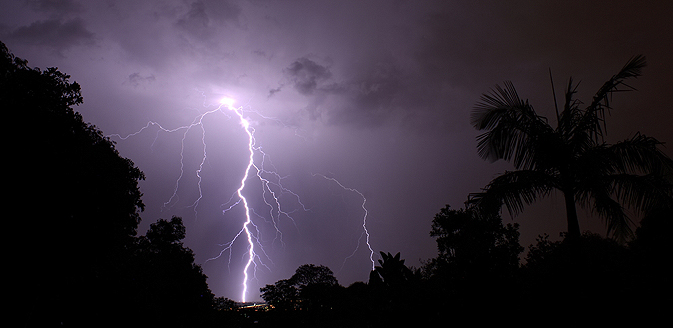Lightning Policy

Before the storm ...
-
 Check weather forecasts before going to your game.
Check weather forecasts before going to your game. -
 Watch for signs of an approaching storm such as distant lightning and darkening, towering clouds.
Watch for signs of an approaching storm such as distant lightning and darkening, towering clouds. -
 Make sure you have access to Radio (for weather updates) at your athletic field complex or any other
outdoor venue.
Make sure you have access to Radio (for weather updates) at your athletic field complex or any other
outdoor venue. -
 Look for environmental clues such as dark clouds and strong winds that may signal a severe thunderstorm. When you hear a warning, take appropriate action.
Look for environmental clues such as dark clouds and strong winds that may signal a severe thunderstorm. When you hear a warning, take appropriate action.
When you hear thunder ...
-
 Anytime lightning is visible, then all players, coaches, fans and officials should Take Shelter Immediately!. Move inside a sturdy building for greater protection. Avoid picnic or rain shelters.
Anytime lightning is visible, then all players, coaches, fans and officials should Take Shelter Immediately!. Move inside a sturdy building for greater protection. Avoid picnic or rain shelters. -
 Once inside a building, close all windows and outside doors. Stay off the telephone and stay away from doors, windows, electrical outlets and metal pipes.
Once inside a building, close all windows and outside doors. Stay off the telephone and stay away from doors, windows, electrical outlets and metal pipes. -
 If you cannot get to a building, seek shelter in an automobile with a metal roof. Close all windows and doors, and avoid touching any inside metal.
If you cannot get to a building, seek shelter in an automobile with a metal roof. Close all windows and doors, and avoid touching any inside metal. -
 Flash (Bang) Method - Count seconds between lightning flash and thunder and divide by 5 - this gives the distance of lightning in miles. If count is 30 seconds or less stay inside.
Flash (Bang) Method - Count seconds between lightning flash and thunder and divide by 5 - this gives the distance of lightning in miles. If count is 30 seconds or less stay inside.
Soccer Games and practices ...
 Soccer fields are dangerous places during a thunderstorm.
Because lightning tends to strike the tallest object, metal bleachers, fences, light poles, field goal posts or soccer goal posts are especially hazardous. When lightning hits these objects, the charge travels through
the metal, shocking anyone in its path. Lightning can also "splash" or "ricochet" off these objects and strike nearby people.
Soccer fields are dangerous places during a thunderstorm.
Because lightning tends to strike the tallest object, metal bleachers, fences, light poles, field goal posts or soccer goal posts are especially hazardous. When lightning hits these objects, the charge travels through
the metal, shocking anyone in its path. Lightning can also "splash" or "ricochet" off these objects and strike nearby people.
If caught outdoors and you cannot get to a building ...
-
 Find a low spot away from trees, fences and poles.
Find a low spot away from trees, fences and poles. -
 If you are near the woods, take shelter under the shorter trees or low brush.
If you are near the woods, take shelter under the shorter trees or low brush. -
 If you feel your skin tingle or hair stand on end, squat low to the ground on the balls of your feet.
If you feel your skin tingle or hair stand on end, squat low to the ground on the balls of your feet.
 Place your hands over your ears to protect your hearing from the sound of a close thunderclap.
Place your hands over your ears to protect your hearing from the sound of a close thunderclap.
 You want to make yourself the smallest possible target while minimizing your contact with the ground.
You want to make yourself the smallest possible target while minimizing your contact with the ground. -
 If anyone is struck by lightning (players, coaches, fans or referees) CALL 911 IMMEDIATELY.
If anyone is struck by lightning (players, coaches, fans or referees) CALL 911 IMMEDIATELY. -
 People struck by lightning carry no electrical charge and can be handled safely.
People struck by lightning carry no electrical charge and can be handled safely. -
 The injured person has received an electrical shock and may be burned, both where they were struck and where the electricity left their body. Check for burns in both places.
The injured person has received an electrical shock and may be burned, both where they were struck and where the electricity left their body. Check for burns in both places. -
 Give first aid. If breathing has stopped, begin rescue breathing. If the heart has stopped beating, a trained person should give CPR.
Give first aid. If breathing has stopped, begin rescue breathing. If the heart has stopped beating, a trained person should give CPR.
When to resume outdoor play ...
-
 Return to your activities at least 30 minutes after the last sound of thunder or flash of lightning.
Return to your activities at least 30 minutes after the last sound of thunder or flash of lightning.
Learn First Aid and CPR
![]() Take a Red Cross first aid and CPR course. Call your local Red Cross chapter for class schedules and fees.
Take a Red Cross first aid and CPR course. Call your local Red Cross chapter for class schedules and fees.
Courtesy VDEM
